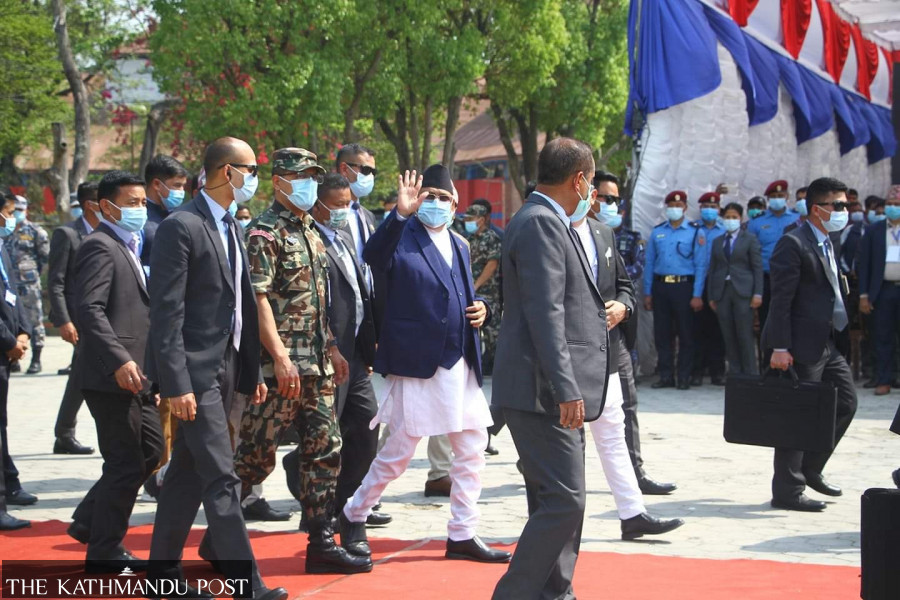National
Government randomly allocates equal funds for all constituency-based road projects
Prime Minister KP Sharma Oli laid the foundation for 165 road projects in his inauguration and foundation-laying spree in April.
Prithvi Man Shrestha
In an example of random distribution of resources, the government has allocated equal funds for electoral constituencies-focussed road projects irrespective of their location, length, and their current status.
The government, through the budget for the next fiscal year 2021-22, allocated Rs12 million each for the road projects to be implemented in all the 165 constituencies under the Electoral Constituency Strategic Roads Programme.
Prime Minister KP Sharma Oli laid the foundation for the 165 road projects in April in his inauguration and foundation-laying spree while the Department of Roads was in the dark about the status of the proposed projects.
“When we proposed a budget for these road projects in mid-May in the run-up to budget preparations, we had no basis for resource distribution,” said Shiva Prasad Nepal, deputy director general at the department. “We were unaware of the proposed length of the roads and whether the detailed project reports for any of them had been prepared and how much resources each road would require.”
He said amid such confusion, they decided to allocate equal funds for such roads. “We did this to avoid being accused of being biased as we didn’t have any information on the proposed road projects,” he said.
Prime Minister Oli went on an inauguration and foundation-laying spree after President Bidya Devi Bhandari first dissolved the House of Representatives on December 20 last year on his recommendation.
Critics called the foundation-laying campaign a tactic to influence the midterm elections, which had been scheduled for April 30 and May 10. The polls plans fell flat after the Supreme Court on February 23 reinstated the lower house.
When their foundations were laid in April, the detailed project reports (DPR) had been completed for only less than a dozen of the roads. Now, according to Nepal, there are around 65 road projects whose DPRs have been completed. The department has deployed teams to prepare DPRs for around 100 roads, Nepal said.
Even for projects whose DPRs are ready, initial environmental examinations (IEE) should be conducted for two dozen of them, according to the department. “We have already worked out the cost estimates for around half a dozen projects, so now we can prepare the tender documents and invite bids from contractors,” said Nepal.
Even though the government’s official policy has been to allocate resources only for the projects that are ready for implementation, the current allocation of equal funds for all the road projects under Electoral Constituency Strategic Roads Programme show that there have not been adequate preparations for their implementation, said former finance secretary Suman Sharma.
“When you allocate funds without preparations, the chances of the money being spent haphazardly just for the sake of exhausting funds are high and this can invite environmental disasters.”
He said the roads department should have at least inquired about the project’s locations before proposing the funds because they could estimate the costs based on the geographical area. Construction cost is usually higher in mountain and hill districts compared to the Tarai.
“They should allocate funds only after ascertaining whether the project concerned needs funds for preparing DPR or IEE,” he said.
The department said, according to its standard policy a maximum of Rs600 million is allocated per road project to be implemented in mountain districts with a single electoral constituency. Likewise, the maximum budget to be allocated for a road in districts with two electoral constituencies is Rs400 million and maximum Rs250 million is allocated for a road in districts with at least three constituencies. For the Kathmandu Valley, the department has fixed a maximum of Rs 200 million per project per constituency.
As per the Department of Roads, the estimated cost of the 165 road projects stands at Rs57.1 billion which was prepared based on evaluation of similar other road projects excluding the cost of preparing the DPR.
“If you allocate equal funds, it leads to more inequality because the cost of construction is different in different geographical areas,” former secretary Sharma said.
Officials at the department, however, said they would allocate funds appropriately in the upcoming fiscal years once the DPRs and cost estimates for each of the roads are ready.
“This time, we had no option but to allocate equal funds so as to avoid any allegation of political bias,” said Arjun Jung Thapa, director general at the roads department. “Had there not been the political factor, we could have allocated the funds differently for different projects.”




 20.12°C Kathmandu
20.12°C Kathmandu















